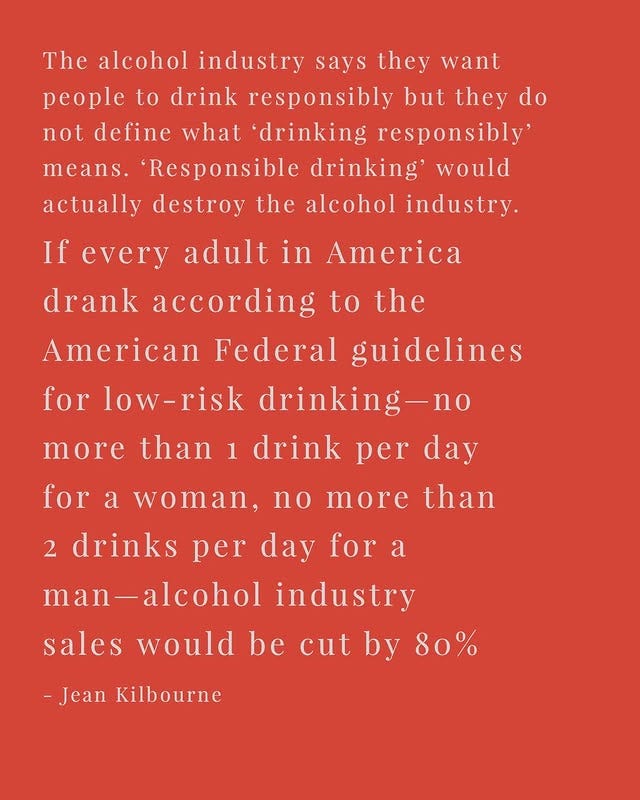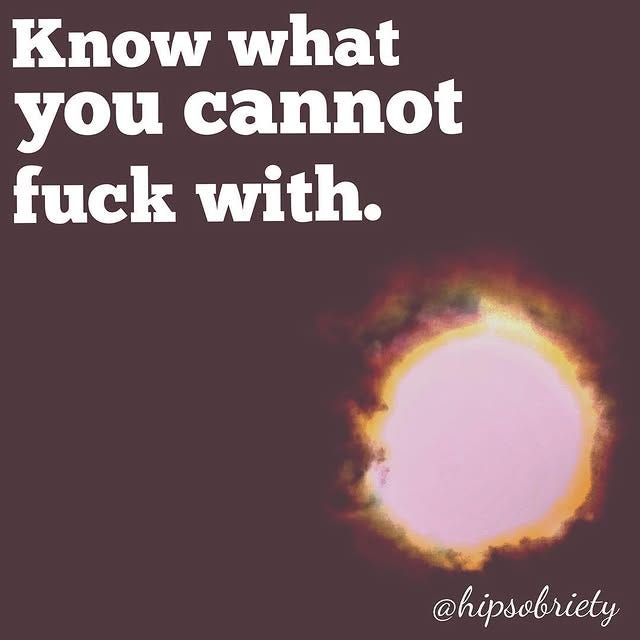Q: Can you moderate alcohol?
P.3: Exploring how neurodivergence, hormones, and cPTSD reshape recovery
Last week I shared a conversation between my friend Carrie Wilkens and myself (“Relapse isn’t what you think”). We primarily discussed why people return to use or relapse, what relapse is and how we define it, and what addiction actually is (is it stimming, is it nervous system management?) and how that is evolving, and we talk very candidly about my return to cannabis (Carrie was one of the first people I interviewed for my upcoming book).
Inevitably, we get into discussing whether or not it’s possible to moderate (anything, especially after addiction), and I bring up this article I wrote in 2022 (see below), before I used cannabis, where I answered a reader’s question about whether they can moderate alcohol. I was certain I was going to want to change a lot of it and it turns out I stand by pretty much all of it.
Carrie makes it clear in our episode that she would never answer someone if they asked her if they could moderate; she thinks it would be wholly irresponsible since every single one of us is different, and that you cannot answer this question for someone else; it can only be answered by ourselves. I agree.
Dear Recovering:
Is it possible to drink alcohol in moderation? I am now reading Mindful Drinking by Rosamund Dean who says that it is. I know the continuum of alcoholic on the left and nondrinker on the right. I like to drink and would fall somewhere left of center. There have been long periods of time when I would drink every day. We have a country house and Thursdays are cocktail hour where we could have as many as a dozen people. Not unusual to have 3 plus vodkas, a bottle of wine and after dinner drinks.
I should point out that years ago, I quit drinking for several years. During this time, I was the leading candidate to become [big job] of [redacted]. During an interview, [redacted] brought out a bottle of wine, and I think the fact that I did not drink cost me the job.
I do give up alcohol every year during lent. AND, I stopped drinking February 1st as part of a weight loss competition and have not started again. I would like to enjoy alcohol in moderation, but do not want to go back to where I was with a habit of drinking every day.
Sincerely,
Wondering
Dear Wondering,
You’re asking whether I believe people can moderate alcohol. The short answer is: sure. The long answer is long.
1. Disclaimer
This past winter when I was interviewed for the Well + Good1 podcast, the host asked me what advice I had for someone who was going to brunch and not drinking alcohol. The question wasn’t about cravings or dignity or addiction, it was about being left out, not having as much fun as everyone else, or having to explain your virgin orange juice. And because either I was really tired, or because this same “wellness” company had that day posted a meme about how wine was self-care, or because I’d just spent a week in zero-degree weather without heat or electricity due to a biblical-ass ice storm, I sighed, and said something like “My advice is this: the world is on fucking fire, if your biggest issue is you can’t get brunch-drunk or you might have an awkward moment turning down a mimosa, you’re doing fine.” Then I went off on some tangent about alcohol as a government sponsored drug meant to keep us complacent and out of power, blah blah blah.
I’m sure I don’t need to tell you that they didn’t air any of this. They edited it to make me sound like a likable, aspirational lady here to help you crush your first Sober Curious Brunch (which, to be fair, is not outside my range), instead of a woman who has possibly spent too much time with her cat reading books on totalitarianism and raised-bed gardening.
I’m not opening with this story to answer your question, but to set an honest expectation. You’re asking someone who hasn’t had a drink in over nine years whether I think you should keep trying to make alcohol work, and I want to be clear that I’m biased, that my answer is subjective. I recently made it through getting kicked out of my company, losing most of my wealth and pretty much all my future plans, an ego death, a global pandemic, and two lonely lonely years in the deep dark woods without using alcohol or drugs2. I am not the kind of person inclined to believe one needs alcohol to survive the worst years of their life; I am also not kind of person inclined to believe one needs alcohol to enjoy the best ones, either.
That being said, I don’t have a horse in this race—I don’t care if you drink. I don’t care if anyone drinks. I care that you are true to yourself, that you make decisions that feel in alignment with your values and true desires. I care that you are at peace and living your best life, whatever that looks like.
Okay, enough throat clearing! Onto your question. The best way I know how to answer whether someone can moderate alcohol is through a series of observations I’ve made over the years, and then try and sum it up at the end.
2. There’s a reason people don’t “moderate” cigarettes
I’ve given about a hundred interviews over the past 7 years, give or take. Because of the entrenched beliefs we have about alcohol in the U.S.3 and because of the normalization and sheer ubiquity of drinking, in maybe half of those interviews I’ve been asked whether or not we can’t just moderate alcohol. Think about that: There I am, a person who has suffered from the use of alcohol, who has written a book about how terrible and pointless drinking is, who ran an entire company dedicated to helping people not die from drinking alcohol, and interviewers—instead of being alarmed by the damage caused by alcohol!!—are alarmed that someone would suggest none of us should use it.
I usually answer those moderation questions with another question: If we were talking about cigarettes, would you ask me about moderation? Do you think there’s a safe level of cigarette smoking that qualifies as moderate? If not, why not? Do you know anyone who smokes and isn’t addicted? Can some people use cigarettes without being harmed or harming? Is it extreme to suggest that none of us should use tobacco products?
We have very different cultural and societal attitudes and beliefs about cigarettes than we do about alcohol and I don’t need to get into them here; you know them. I use the cigarette as an example only because those commonly held beliefs about smoking are as entrenched as they are around alcohol, in almost opposing ways. Part of why you’re asking whether or not you can moderate alcohol is because you’ve been conditioned to believe ethanol is a good drug you’re supposed to use, that your life will be better with, just like you’ve been conditioned to believe nicotine is a bad drug you’re not supposed to use, that your life will be better without. These are constructs—not full, objective truths.
RECENT ARTICLES
When you say “moderate” alcohol you’re using it as a verb, and in our current zeitgeist, we don’t “moderate” any other psychoactive drug (you probably haven’t come across books on mindfully using meth, for instance.) This language exists specific to alcohol, and, IMO, exists to reinforce a false narrative that alcohol isn’t dangerous, problematic, toxic, or addictive, that we can control it if we try hard enough, that we should try hard to keep it in our lives versus just not use it at all.4
3. People who don’t have a problem with alcohol don’t have to work at moderating alcohol
When I first got sober I believed everyone cared to some degree about alcohol the way I did—they just controlled it better. It was a revelation to learn that I was wrong, that there are many, many people who don’t care about drinking alcohol (like at all). Alcohol is to them what something like prunes are to me: I like prunes enough, I’ll have them if they’re around, I can eat just one, and if I never have a prune again in my life I wouldn’t even think to miss it.
One time I had a partner (let’s call him George) who invited me to a bar on our first date without realizing I didn’t drink alcohol; he switched to seltzer when I told him, and he didn’t even finish his drink (?@!?). A month into our relationship he confided he’d “Just stopped drinking” that first night like he’d just stopped using fluoride toothpaste. To recap: This guy had one date with me, considered my stance on alcohol, gave it up on the spot. Over the year+ we dated I think he got drunk on a trip with his friends or something, probably had a few beers when I wasn’t around, but he basically went teetotal. No effort or anything like that.
When we’re asking if we can moderate alcohol, I think we’re sometimes asking if we can be like George—if we can just not care so much about it—without realizing that George has probably never once hoped he could moderate alcohol like you and I have. Alcohol is his prunes. Alcohol has no meaning to him.
George is not moderating. George isn’t efforting at all. You cannot be like George.
This doesn’t mean you can’t “moderate” alcohol, but this does mean if you keep it in your life, it won’t be a breezy, fun little affair, or an afterthought, or something you throw out entirely for a year without effort because you like a girl. If you decide to keep it in your life—to moderate—it will be work, just like it’s always been work.
(Also see: Know what you cannot fuck with)
4. It’s not a question of whether you can or cannot moderate; it’s a question of what kind of life you want
I can’t peak into your life and count what matters to you; I don’t know how important alcohol feels vs how important everything else does. We each have our own sets of values, our own priorities, likes and dislikes, and so forth, and because I am not you I cannot say definitively that your life will be better if you remove alcohol entirely or if you manage to successfully moderate (and successfully moderate, as we’ve discussed, is subjective. No one knows what that means).
I can tell you at one point, the thought of never drinking again felt like a death sentence. Unfathomable. Extreme. Costly. It turned out to be all those things. It was an extreme choice with unfathomable results and costly, expensive consequences. It also purchased me a number of things, namely, the freedom to never have to think about alcohol again, and a life that continues to exceed expectation—a very big, beautiful, complicated life that I fully live into, that I would not trade for all the best drinking days in the world.
If it were not you I was talking to but 2012 me—the one with all the reasons to to make it work, the one about to buy a book called The Easyway To Control Alcohol even though she was shitting blood and ruining her relationships and toeing the line of unemployment because KEEPING THE ALCOHOL WAS IMPORTANT—I’d be blunt. I’d say you don’t get both; you don’t get the really big life and winery tours. I’d say trying to keep your feet in two worlds is a really great way to not live at all.
But I’m not talking to 2012 me. I’m talking to you.
5. In summary
I could keep going on and break out into tangents. I could write a whole book on this topic (and in some ways, I did). But I’ll stop here.
You asked if I believed you could moderate alcohol, and I’d like to point out you already are moderating. It also seems—at least based on the information you’ve provided—you’re doing a very good job of it. Honestly? A number of people reading your letter will wish they could control alcohol like you do.
I don’t think that’s what you’re asking though, and I can’t answer what you’re asking. Only you can. Isn’t that terrible? Isn’t that great?
What I can tell you, with certainty, is that it isn’t about what decision you make. That you have the question at all, that you’re asking it, that you’re brave enough to look in all the corners of the internet and all the corners of your psyche and soul, that you’re here doing this scary big work of examining yourself and your life: this is the point. THIS is the work. And you’re doing it. Right now.
With love, admiration, respect, and excitement for you,
Hol
This is the THIRD part of the series After Quit Like a Woman: Exploring how neurodivergence, hormones, and cPTSD reshape recovery I talked about here.
Part 2, Everything we know about relapse is wrong, is here
Part 4, We got sober. Then we got our ADHD diagnosis. This is what happened next, is here
Please see footnote about abstinence-based methods, and other footnotes, including updated ones about my change in substance use (or see this article, On using cannabis in recovery).
a popular wellness publication
THIS WAS WRITTEN PRIOR TO ME RETURNING CANNABIS USE. SEE ARTICLE REGARDING THAT HERE. [ORIGINAL FOOTNOTE, SPRING 2022: From 2020 to 2022 I did use drugs. I used psilocybin in what would be defined as “therapeutic” (hated it); I discussed this on the Amanda Decadanet show. I had three bulimic episodes which I discussed on another podcast, and used pot twice, once to stop vomiting, once on the day I left Tempest. I also drink coffee every day, take ibuprofen when I have cramps, put botox in my forehead, etc. I don’t count any of this as relapse or violation of my sobriety, which I’ve counted since I stopped drinking, not since I stopped using drugs. I’m sure I will discuss this at length at some point, most likely in my next book. Just not now. I realized I said “didn’t use drugs” over the past few years and that’s not an honest statement.]
You’re expected to drink and be able to make it work without consequence; it’s seen as a joy- and pleasure-giving, necessary substance; it’s the answer to every problem and the center of every celebration; you only abstain if you’re an “addict” or “alcoholic”, etc.
I want to be clear I’m not interested in creating fear or hysteria around alcohol or demonizing it; people use drugs, all drugs carry certain risks, drug use isn’t inherently good or bad and neither are the drugs themselves. However, alcohol, unlike every single other psychoactive drug (save caffeine), is the only drug we are conditioned to use; we are marketed it in ways that consistently assault and subvert our logical reasoning; it is not like any other drug.









Hey Holly. Gosh, I’ve been reading and listening to your words for so long now. I was one of your first Hip Sobriety students too. (Back in 2014? Can that be right?!) Anyway, I love all the stuff you’re currently digging into on return to use. So interesting and I happen to align with you on all of it. I keep wondering though: WHY did you go back to your cannabis use? Absolutely zero judgement. I reengaged with alcohol after years of continuous sobriety myself, having had a horrendous addiction to it years before. My WHY was bc - I could. I just had a nagging feeling that I’d actually be able to take or leave it, having worked through all the reasons I drank addictively in the first place. (I don’t believe in the disease model at all. It never made sense to me.) Anyway, I found that I could moderate with no problem. (I now leave it though just bc: general health reasons and I don’t rely on it for anything anymore anyway, having learnt to successfully live without it for so long. Any benefits just weren’t worth it to me. Happy to have ran that experiment on myself though!) I am so curious to hear your why - if you’re happy to share. Love that you’re so honest about your recovery experience. All the love.x
This is so fucking good.